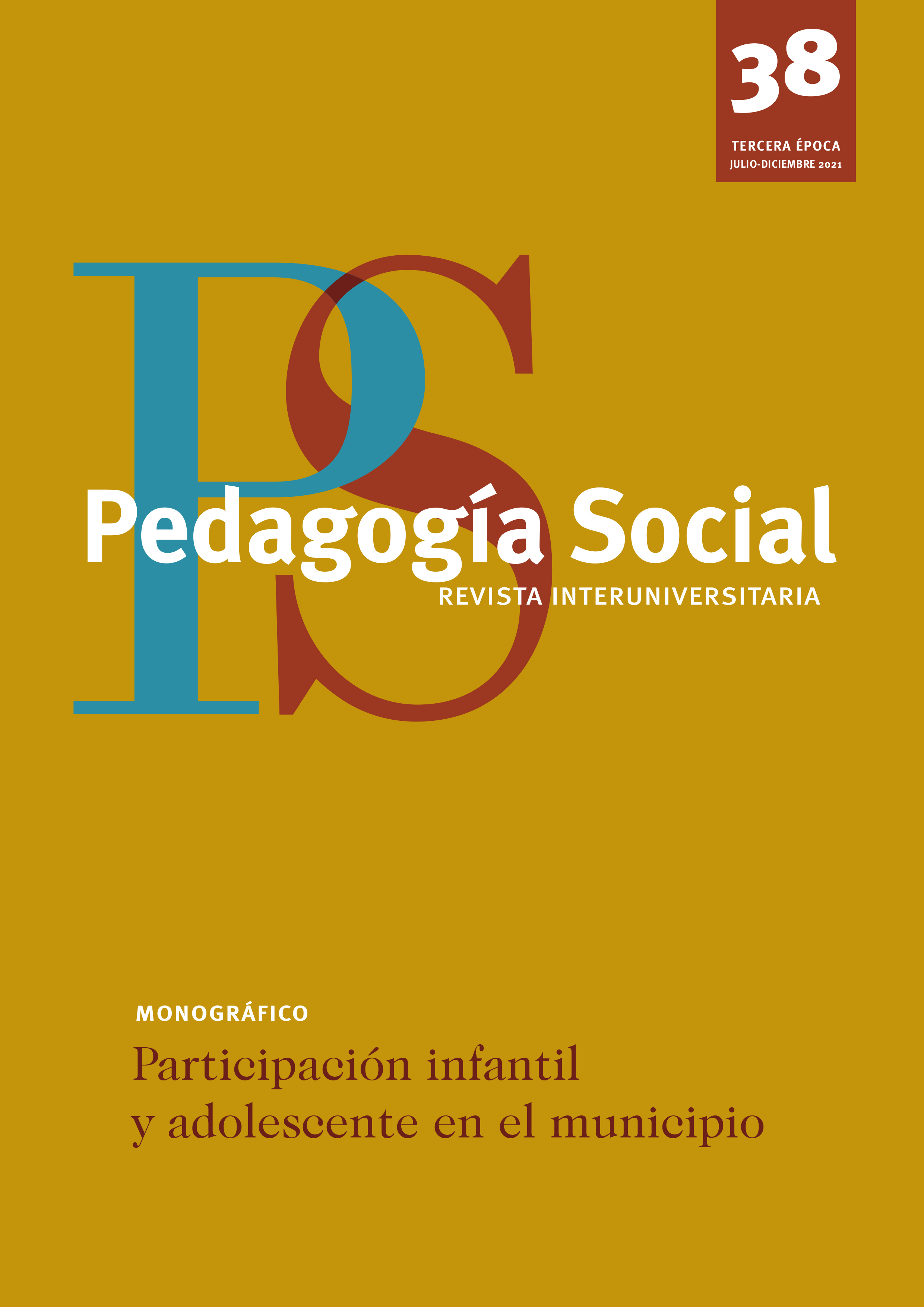Escenarios de participación de la infancia.
Oportunidades para la coproducción en los municipios
DOI:
https://doi.org/10.7179/PSRI_2021.38.04Palabras clave:
inclusión; gobernanza; participación ciudadana; infancia; escenarios de participación; coproducción;Resumen
Los nuevos marcos de gobernanza requieren una ciudadanía inclusiva desde donde conceptualizar y planificar la participación local. En el caso de la infancia y la adolescencia, la participación ciudadana se desarrolla en escenarios promovidos a nivel institucional o por ellos mismos como colectivo organizado. Estos escenarios favorecen procesos de coproducción desde acciones que inciden en la política municipal. De una parte, este trabajo persigue explorar la densidad de escenarios de participación que existen en los municipios, así como las variables que definen la existencia de uniescenarios y multiescenarios. Por otra parte, pretende caracterizar los tres escenarios de participación infantil y adolescente para la coproducción municipal. Se ha llevado a cabo un estudio de carácter exploratorio y descriptivo a partir de un muestreo bietápico por conglomerados. Para la recogida de información se ha realizado una encuesta autoadministrada en línea a 176 figuras técnicas municipales. El proceso de análisis empleado ha sido para los datos cuantitativos mediante el software estadístico SPSS V. 25 y para los datos textuales por una combinatoria de dos técnicas: análisis multidimensional mediante el software Iramuteq y un análisis de contenido. Los resultados ponen de manifiesto que los municipios con mayor densidad de escenarios de participación se caracterizan por estar más habitados, tener un mayor recorrido en políticas participativas y/o una mayor dedicación técnica, siendo el escenario dominante el órgano municipal. La forma de participación que predomina en los tres escenarios es la consultiva, seguida de la proyectiva, según se identifica en las acciones que caracterizan a cada escenario. Las conclusiones evidencian la necesidad de amplificar el número de escenarios que conviven y aportan y de que en estos se establezcan cinco niveles de coproducción de las infancias: sensibilización y concienciación; promoción, defensa y atención; diagnóstica; organizativa; y estratégica o macropolítica.
Descargas
Descargas
Publicado
Cómo citar
Número
Sección
Licencia
Derechos de autor 2021 Pedagogía Social. Revista Interuniversitaria

Esta obra está bajo una licencia internacional Creative Commons Atribución-NoComercial-CompartirIgual 4.0.
Derechos de reproducción y archivo
La versión publicada de los artículos podrá ser autoarchivada por sus autores en repositorios institucionales y temáticos de acceso abierto. No obstante la reutilización total o parcial de los mismos en nuevos trabajos o publicaciones deberá ser autorizada por Pedagogía Social. Revista Interuniversitaria.
Los trabajos publicados deberán ser citados incluyendo el título de la Revista, Pedagogía Social. Revista Interuniversitaria, nº, páginas y año de publicación.
Responsabilidades éticas
Pedagogía Social. Revista Interuniversitaria no acepta material publicado anteriormente en otros documentos. Los/as autores/as son responsables de obtener los permisos oportunos para reproducir parcialmente material de otras publicaciones y citar correctamente su procedencia. Estos permisos deben solicitarse tanto al autor/a como a la editorial que ha publicado dicho material.
Es obligación de Pedagogía Social. Revista Interuniversitaria detectar y denunciar prácticas fraudulentas.
En la lista de autores/as firmantes deben figurar únicamente aquellas personas que han contribuido intelectualmente al desarrollo del trabajo.
La revista espera que los/as autores/as declaren cualquier asociación comercial que pueda suponer un conflicto de intereses en conexión con el artículo remitido.
Los autores deben mencionar en el manuscrito, preferentemente en el apartado del método, que los procedimientos utilizados en los muestreos y controles han sido realizados tras la obtención de consentimiento informado.
La revista no utilizará ninguno de los trabajos recibidos con otro fin que no sea el de los objetivos descritos en estas normas.
Aviso de derechos de autor/a
© Pedagogía Social. Revista Interuniversitaria. Los originales publicados en las ediciones impresa y electrónica de esta Revista son propiedad del Pedagogía Social. Revista Interuniversitaria, siendo necesario citar la procedencia en cualquier reproducción parcial o total.
Salvo indicación contraria, todos los contenidos de la edición electrónica se distribuyen bajo una licencia de uso y distribución “Creative Commons Reconocimiento-No Comercial 3.0 España” (CC-by-nc). Puede consultar desde aquí la versión informativa y el texto legal de la licencia. Esta circunstancia ha de hacerse constar expresamente de esta forma cuando sea necesario.






